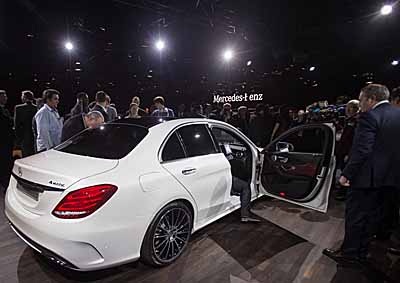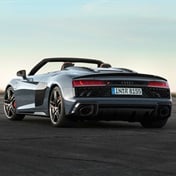
<b>NEXT C-CLASS LAUNCHED IN DETROIT:</b> Journalists and car enthusiasts gather to feast their eyes on the new Mercedes-Benz C-Class and other exciting models at the 2014 Detroit auto show.<i> Image: AFP</i>
DETROIT, Michigan, American consumers have a taste for luxury and automakers are rushing to deliver by upgrading interiors, loading up on fancy features and expanding their offerings with stylish new models.
Some analysts warn that the line between the mass market and premium brands is blurring as automakers vie for attention in a bustling and highly competitive industry.
Voice-activated 'infotainment' systems, leather seats and rear-view cameras are becoming standard, even in entry-level cars. And the speed at which innovative features migrate downwards is accelerating
'NOT GETTING THE IMAGE'
While the options race has increased pressure on luxury brands to innovate, the prestige associated with their brands is what truly sets them apart.
Tom Libby, an analyst with IHS Automotive, said: "You can get a Nissan Maxima or Buick LaCrosse with an extraordinary amount of content. But the one thing you're not getting is the image," said . "That's why people aren't driving the Genesis - it's put out by Hyundai."
The real danger comes from the introduction of down-market models being introduced by premium brands to capture new customers with a lower price point.
Dave Sargent, vice-president for global automotive analysis with JD Power, explained: "The thing you have to be careful of is if you sell too many vehicles, you're not premium anymore. If everybody is driving a BMW, you're not special any more."
There was also the risk that, instead of capturing new customers, existing ones would simply buy the cheaper models.
Mercedes shook things up in 2013 year with the CLA, a sleek but small sedan offered with a base price of $29 700.The German automaker insists its "breakthrough" car is no threat to its prestige or its previous entry-level option, the best-selling C-Class. Some 80% of CLA buyers were new to the brand and most were much younger than the typical Mercedes customer.
'FORCED TO GO SMALLER'
Mercedes-Benz chief Dieter Zetsche said as he unveiled an updated - and upgraded - C-Class at the 2014 Detroit auto show: "The huge excitement which goes around the CLA is beneficial for the brand altogether. It brings more dynamics, more coolness, to the brand."
Luxury automakers aren't just chasing new customers with their down-market options, said
Bob Carter, head of automotive operations for Toyota Motor USA, added: "They're also being forced into introducing smaller cars and less powerful engines in order to meet upcoming regulations tightening corporate average fuel efficiency standards."
Unlike its main competitors, Toyota's luxury arm, Lexus, doesn't need to downsize its engines and options to meet the new rules. The Japanese automaker is able to get its overall numbers down with the smaller vehicles sold by the Toyota and Scion brands.
"The advantage of having three brands, as we have, is we're able to keep clearly succinct brand clarity," he told AFP in an interview on the sidelines of the auto show.
LIGHTER RANGIES
Andy Goss, head of global sales for Jaguar and Land Rover, said going small - or even less expensive - didn't have to mean going downmarket. "We're packaging luxury in a different way with smaller vehicles," he told AFP.
The key is to maintain the same level of quality and "stay true to the DNA of a Jaguar or Land Rover". There were many ways improve fuel efficiency without damaging the brand.
The Tata-owned luxury auto maker managed to lower the weight of the new Range Rover by 360kg by incorporating more aluminum into its body and streamlining parts and components. It is also exploring hybrids and the possibility of introducing diesel options in the US.
The German automakers who dominate the luxury market - Mercedes and BMW, followed by Volkswagen's Audi and Porsche - have already introduced a number of hybrid and diesel options and are also bringing electric and eventually hydrogen-powered vehicles to market.
INTENSE COMPETITION
They have also been improving fuel efficiency and performance by taking weight out of their vehicles and integrating carbon fiber and other materials into their frames though it's not yet clear if this will be sufficient to meet the new standards while also maintaining premium performance.
Despite the intense competition in the luxury market, German automakers posted record sales in 2013 of 1.3-million vehicles, a five percent increase. Germany's VDA automakers' association expects luxury sales to expand to 11 to 12% of the US market from 10% in 2013.
VDA president Matthias Wissmann told reporters: "We are confident the premium market, which we dominate, will grow."
Some analysts warn that the line between the mass market and premium brands is blurring as automakers vie for attention in a bustling and highly competitive industry.
Voice-activated 'infotainment' systems, leather seats and rear-view cameras are becoming standard, even in entry-level cars. And the speed at which innovative features migrate downwards is accelerating
'NOT GETTING THE IMAGE'
While the options race has increased pressure on luxury brands to innovate, the prestige associated with their brands is what truly sets them apart.
Tom Libby, an analyst with IHS Automotive, said: "You can get a Nissan Maxima or Buick LaCrosse with an extraordinary amount of content. But the one thing you're not getting is the image," said . "That's why people aren't driving the Genesis - it's put out by Hyundai."
The real danger comes from the introduction of down-market models being introduced by premium brands to capture new customers with a lower price point.
Dave Sargent, vice-president for global automotive analysis with JD Power, explained: "The thing you have to be careful of is if you sell too many vehicles, you're not premium anymore. If everybody is driving a BMW, you're not special any more."
There was also the risk that, instead of capturing new customers, existing ones would simply buy the cheaper models.
Mercedes shook things up in 2013 year with the CLA, a sleek but small sedan offered with a base price of $29 700.The German automaker insists its "breakthrough" car is no threat to its prestige or its previous entry-level option, the best-selling C-Class. Some 80% of CLA buyers were new to the brand and most were much younger than the typical Mercedes customer.
'FORCED TO GO SMALLER'
Mercedes-Benz chief Dieter Zetsche said as he unveiled an updated - and upgraded - C-Class at the 2014 Detroit auto show: "The huge excitement which goes around the CLA is beneficial for the brand altogether. It brings more dynamics, more coolness, to the brand."
Luxury automakers aren't just chasing new customers with their down-market options, said
Bob Carter, head of automotive operations for Toyota Motor USA, added: "They're also being forced into introducing smaller cars and less powerful engines in order to meet upcoming regulations tightening corporate average fuel efficiency standards."
Unlike its main competitors, Toyota's luxury arm, Lexus, doesn't need to downsize its engines and options to meet the new rules. The Japanese automaker is able to get its overall numbers down with the smaller vehicles sold by the Toyota and Scion brands.
"The advantage of having three brands, as we have, is we're able to keep clearly succinct brand clarity," he told AFP in an interview on the sidelines of the auto show.
LIGHTER RANGIES
Andy Goss, head of global sales for Jaguar and Land Rover, said going small - or even less expensive - didn't have to mean going downmarket. "We're packaging luxury in a different way with smaller vehicles," he told AFP.
The key is to maintain the same level of quality and "stay true to the DNA of a Jaguar or Land Rover". There were many ways improve fuel efficiency without damaging the brand.
The Tata-owned luxury auto maker managed to lower the weight of the new Range Rover by 360kg by incorporating more aluminum into its body and streamlining parts and components. It is also exploring hybrids and the possibility of introducing diesel options in the US.
The German automakers who dominate the luxury market - Mercedes and BMW, followed by Volkswagen's Audi and Porsche - have already introduced a number of hybrid and diesel options and are also bringing electric and eventually hydrogen-powered vehicles to market.
INTENSE COMPETITION
They have also been improving fuel efficiency and performance by taking weight out of their vehicles and integrating carbon fiber and other materials into their frames though it's not yet clear if this will be sufficient to meet the new standards while also maintaining premium performance.
Despite the intense competition in the luxury market, German automakers posted record sales in 2013 of 1.3-million vehicles, a five percent increase. Germany's VDA automakers' association expects luxury sales to expand to 11 to 12% of the US market from 10% in 2013.
VDA president Matthias Wissmann told reporters: "We are confident the premium market, which we dominate, will grow."




 Publications
Publications
 Partners
Partners











